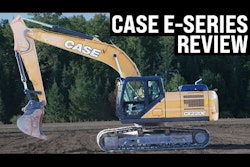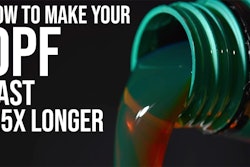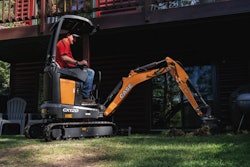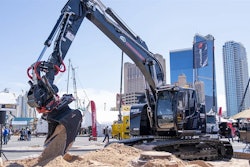Equipment right to repair has been a hot topic in automotive, agricultural equipment and mobile phone industries, and it’s also been a concern of construction equipment manufacturers and dealers in response to legislation in Congress and some states.
In this episode of The Dirt, we hear from Daniel Fisher, senior vice president for government and external affairs for the Associated Equipment Distributors. Fisher outlines the concerns manufacturers and dealers have about bills to change repair laws and the potential consequences for the industry.
Fisher says AED is “not against right to repair, but right to modify.”
To find out more about what he means and to gain a better understanding of this complex topic and how it affects equipment repair, check out the latest episode of The Dirt above.
{Related content: Last month on The Dirt, we heard from an advocate of right-to-repair legislation: A Closer Look at Equipment Right to Repair.}
Equipment World serves up weekly videos on the latest in construction equipment, work trucks and pickup trucks – everything contractors need to get their work done. Subscribe and visit us at equipmentworld.com!
In this video:
00:00 - Intro: The Other Side of Right to Repair
00:42 - Where Do Dealers and Manufacturers Stand?
01:56 - Current Legislation and What Dealers and Manufacturers Are Opposed To
03:48 - Why Do Consumers Not Have Full Access to Equipment Software?
05:20 - Can OEMs Protect IP While Also Letting Consumers Have Full Access to Equipment Software?
07:07 - How Will Dealerships Be Impacted With Current Right to Repair Legislation?
10:06 - Unintended Consequences & Final Thoughts
11:10 - Outro
Bryan Furnace (00:00):
Hi everyone. Welcome back to Equipment World. You're watching the Dirt. I'm your host Bryan and stay we're here to talk about the other side of the right to repair conversation. As you may recall here, about a month ago we had on someone to talk about right to repair from the side of people wanting to work on equipment in the aftermarket space. Today we're here for the other side of the conversation. How do manufacturers feel about right to repair and what are their arguments against right to repair legislation? Here to talk about this topic with this today as Daniel Fisher with the Associated Equipment Distributors and he's here to represent the other side of the conversation.
Daniel Fisher (00:43):
Dealers and manufacturers don't oppose the right to repair. In fact, we do a lot to support our customers, right to repair. You can walk into a dealership by parts, you have access to the service manuals, you have access to diagnostic tools. And a lot of our dealerships are now doing remote support to help the customer repair their own equipment. I think what it comes down to really is on as far as right to repair goes is that if a tractor or machinery is out of service, that's bad business for everyone involved. And so I think, particularly over the last few years, we've really seen dealers and OEMs get more involved to make sure that whether a customer wants to take their tractor to a third-party repair provider or wants to do it on their own, that they can do the vast substantial majority of repairs on their own.
(01:30):
And I think what we're talking about here is just a very, very few repairs that actually do require you to access embedded software and do those types of things. But as far as repairs, we fully support our customers right to repair. And I think that differentiates us from a lot of the other industries that are on the right to repair, kind of battling this legislation, these proposals across the state and now at a federal level.
Bryan (01:55):
And this is just speaking from my experience on the off-road equipment side and more and more of these machines as they've become digital computerized with computer chips, you're having to get into the software before you can perform some of the basic diagnostics to figure out what's going on. Are the dealerships opposed to third parties getting a hold of that software? What specifically are they really opposed to when it comes to the right to repair dialogue happening right now?
Daniel Fisher (02:23):
Well I think we also need to look at what these bills and these proposals actually do. It's right to repair is kind of a catchy slogan, but it's really a lot more encompassing and a lot more complex than I think proponents of this will lead on. I'll give you an example. In many of these state proposals and the proposals that are actually in Congress right now, they would actually require dealers or actually OEMs to sell directly to consumers parts at cost.
Bryan (02:50):
Oh wow.
Daniel Fisher (02:50):
Imagine the trouble there. I mean it would essentially put dealers out of business. Not to mention the logistical nightmare that would be if OEMs have to sell directly to consumers the parts. That might be the most troubling aspect of a lot of these particular proposals. A lot of the software that's embedded on these machines is there because of environmental regulations, safety regulations that come from the government. So there's obviously liability issues when you start permitting unfettered access to the onboard computer system, whether it's a customer messing around with a machine and then turning in as a trade-in or these other issues. I think it brings up a lot of different issues, environmental safety, liability issues, as well as the economic issues of forcing OEM to sell parts at cost, that really, I think would be personally just would totally disrupt the dealer network that's out there right now.
Bryan (03:48):
It does occur to me too, while people are currently, the big thing in the industry is doing deletes on after treatment exhaust systems on these machines. And it does occur to me it's not so much the ability to do those deletes because it's currently being done. There's people who have found ways to hack the software and do that. It's more of the giving the open ability for people to do that without having to go about it unethically, if that makes sense. Instead of hacking into it, you're now turning over the keys to where it's just, "Yeah, go ahead and modify that stuff." And I could see where the argument against giving people the keys to be able to go and freely do that is. You're now almost condoning that sort of thing. Would you agree with that?
Daniel Fisher (04:27):
Yeah, I think so. But also, the industry, and you probably recall this, I know you were in industry for a while, when we went to tier four equipment. Those were EPA mandates that OEMs meet a certain emission standard. And essentially what you're doing is you're basically saying, "Well you can circumvent that, or there's safety mechanisms." OSHA has various regulations in terms of safety and you're basically saying, "Here's access to go ahead and do that." And so I think that's really the troubling part. And again, I think there's safety issues here when you allow this not just as far as the dealership, but as well as on the operator side. That's why you see, for example, the operating engineers in a lot of states opposing this because they view this as a safety issue for their operators. So I think, again, it seems very simple on its face, but the legislative language is particularly much more complex than I think anyone, a lot of proponents lead on.
Bryan (05:20):
So my next question is, one of the big opposing arguments to the right to repair legislation is the protection of intellectual property. In your mind, can OEMs kind of build in these safeguards to protect their intellectual property while still allowing people to have access to the backend software and diagnostic tools that the dealerships currently have?
Daniel Fisher (05:40):
Yes. I don't know where the technology, that's kind of more of a tech question I guess, also an IP question. But here's just how we of feel about this. OEM's put in a lot of research and development time and that's really what differentiates different OEMs from each other. So that's their intellectual property and that's what makes say for Caterpillar different than Case or John Deere or any of these is really the R&D that they put in and what they have in that intellectual property.
(06:08):
So I think it gets pretty troubling when you're allowing then just everyone to have access to this IP. Now, is there maybe a solution that would as technology progresses that we can kind of figure this out a bit that, I mean certainly it's possible, but I just know where it stands right now is that these companies put in a lot of effort and time and money into developing their proprietary software and just to say, "Hey, everyone can now use that or have access to that software."
Bryan (06:37):
Yeah, they're not fine just handing over the keys to everybody.
Daniel Fisher (06:40):
Exactly. Not only that, I know there's this economic argument obviously, but there's also a security argument. I mean, look at the cyber security situations now. You can have anyone hack in essentially once you start turning the stuff over. And also it's a national security issue as well when you're giving up this IP to countries that we may be considering our adversaries in a lot of ways. So it's an international competitiveness and an international national security issue as well.
Bryan (08:32):
What will the big impact be to the dealerships if right to repair legislation goes forward in its current form?
Daniel Fisher (08:39):
As far as the economics go, as these bills are written, they require OEMs to sell parts at cost directly to consumers. Now parts profit is in many dealerships, the only thing that kind of-
Bryan (08:51):
Keeps the dealership afloat. Really?
Daniel Fisher (08:52):
Yeah, really. And so you get rid of that parts revenue, and I think you're putting a lot of small to medium sized family-owned companies, which are the bulk of the equipment distribution network, out of business. It's just not a viable business at that point. A dealer won't stock parts. And I think it's not just on the dealers. This will completely disrupt, I believe, the whole construction industry in a lot of ways as well as the ag industry. We have supply chain issues now. I think if you look to a situation where you have to have OEMs shipping parts directly to consumers all around the country or the world, I think you're really getting into a situation where I know the proponents are right to repair say that they have their combine stuck in harvest or you have a tractor stuck on a job site and they can't get dealers to service them.
(09:36):
If you think that there's issues now, I think this is just really a going to exasperate the situation. And again, in our industry, I really do believe this is a solution in search of a problem because you have access to the parts, you have access to do the repairs. And again, it's just bad business for us to have idle equipment sitting there unrepaired if a consumer or a customer wants to take it to a third-party repair provider or do it themselves. We'll do everything we can to make sure that's a productive piece of equipment.
Bryan (10:05):
It does kind of sound like it's not there's just this general opposition to the ability to repair your own equipment. It's more of the fact that as often happens with legislation when it gets cast in a broad net with these very general terms, all of a sudden, you're talking about aspects of the industry that really shouldn't be impacted but are going to be impacted in a very material way and start causing hiccups for a lot of other areas of the industry. Would you say that's kind of a good summary?
Daniel Fisher (10:31):
Yes. I mean there's certainly unintended, that I think maybe unintended, but I don't know how unintended they are because they keep popping up in every state. But again, Bryan, you and I talked about this before, legislation's not always the answer to every issue. And again, for as far as the equipment industry goes, I really do believe that we provide the right to repair and we are not against the right to repair, we're against the right to modify. And I really think this is a solution search of a problem in many ways. Maybe our dealers need to do a better job communicating to their customers that they do have the right to repair, but that's a communications issue. That's not a policy issue.
Bryan (11:07):
Well Daniel, thank you so much for the time. I appreciate it.
Daniel Fisher (11:09):
No, thank you for having me.
Bryan (11:10):
Well thank you again to Daniel for taking time out of his day to come talk about this topic with us. As you can see with most of these topics, these are complex issues with multiple viewpoints. So I hope this is giving you a little bit more perspective on a very complex issue. As always, thanks for watching and we'll cut you on the next episode of The Dirt.








